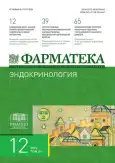Intensification of glucose-lowering therapy for type 2 diabetes mellitus using insulin degludec: clinical case analysis
- Authors: Elsukova O.S.1,2
-
Affiliations:
- Kirov State Medical University
- Kirov Clinical Hospital № 7 n.a. V.I. Yurlova
- Issue: Vol 30, No 12 (2023)
- Pages: 132-137
- Section: Clinical case
- Published: 15.11.2023
- URL: https://journals.eco-vector.com/2073-4034/article/view/626062
- DOI: https://doi.org/10.18565/pharmateca.2023.12.132-137
- ID: 626062
Cite item
Abstract
The article discusses a clinical case of intensification of glucose-lowering therapy with insulin degludec in a patient with type 2 diabetes mellitus (DM2); who did not achieve glycemic control goals despite the use of a combination of three glucose-lowering drugs: metformin; empagliflozin and semaglutide. Fasting and postprandial glycemia was more than 10 mmol/l; the glycated hemoglobin level was 10.4%. In addition; the time above the target range was 85%; and no hypoglycemic conditions were recorded. After intensifying hypoglycemic therapy with insulin degludec; a significant improvement in glycemic control was noted: fasting glucose was 5.4–6.2 mmol/l; postprandial – up to 10 mmol/l; the time in the target range; according to flash data. monitoring was 99%; no hypoglycemic conditions were noted.
Full Text
About the authors
Olga S. Elsukova
Kirov State Medical University; Kirov Clinical Hospital № 7 n.a. V.I. Yurlova
Author for correspondence.
Email: oselsukova@mail.ru
ORCID iD: 0000-0002-2341-9491
Cand. Sci. (Med.), Associate Professor at the Department of Hospital Therapy, Head of the Endocrinology Department
Russian Federation, Kirov; KirovReferences
- Intensive blood-glucose control with sulphonylureas or insulin compared with conventional treatment and risk of complications in patients with type 2 diabetes (UKPDS 33). UK Prospective Diabetes Study (UKPDS) Group. Lancet. 1998 Sep 12;352 (9131):837–53. Erratum in: Lancet. 1999;354 (9178):602.
- Frier B.M.; Schernthaner G.; Heller S.R. Hypoglycemia and cardiovascular risks. Diab Care. 2011;34(Suppl. 2):S132–37.
- Bonds D.E.; Miller M.E.; Bergenstal R.M.; et al. The association between symptomatic; severe hypoglycaemia and mortality in type 2 diabetes: retrospective epidemiological analysis of the ACCORD study. BMJ. 2010;340:4909.
- Cryer P.E. Severe hypoglycemia predicts mortality in diabetes. Diab. Care. 2012;35:1814–16.
- Cryer P.E. Death during intensive glycemic therapy of diabetes: mechanisms and implications. Am J Med. 2011;124:993–96.
- Zinman B.; Marso S.P.; Poulter N.R.; et al. DEVOTE Study Group. Day-to-day fasting glycaemic variability in DEVOTE: associations with severe hypoglycaemia and cardiovascular outcomes (DEVOTE 2). Diabetol. 2018;61(1):48–57.
- Heller S.; Lingvay I.; Marso S.P.; et al. Risk of severe hypoglycaemia and its impact in type 2 diabetes in DEVOTE. Diab Obes Metab. 2020;22(12):2241–47.
- Rodacki M.; Carvalho R.M.; Zajdenverg L. The potential effect of ultra-long insulin degludec on glycemic variability. Diab Res Clin Pract. 2017;133:92–103.
- Amiel S.A.; Dixon T.; Mann R.; Jameson K. Hypoglycaemia in type 2 diabetes. Diab Med. 2008;25(3):245–54.
- Hanefeld M.; Fleischmann H.; Siegmund T.; Seufert J. Rationale for timely insulin therapy in type 2 diabetes withinthe framework of individualised treatment: 2020 update. Diab Ther. 2020;11(8):1645–66.
- Haahr H.; Heise T. A Review of the Pharmacological Properties of Insulin Degludec and Their Clinical Relevance. Clin Pharmacokinet. 2014;53:787–800.
- Danne T.; Nimri R.; Battelino T.; et al. International Consensus on Use of Continuous Glucose Monitoring. Diab Care. 2017;40:1631–40.
Supplementary files










